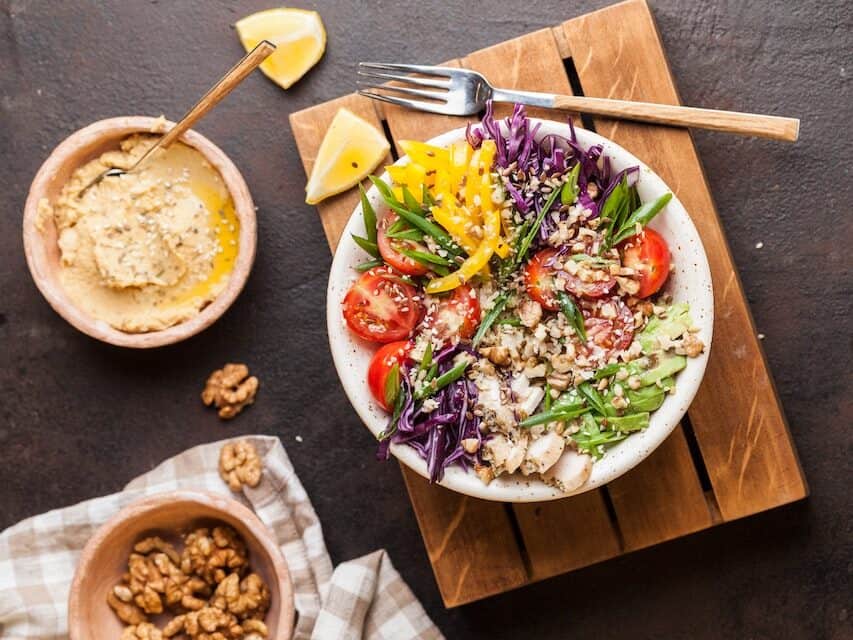Overweight and obesity rates have continued to climb over the years- making weight loss a priority for a lot of people. There are a lot of weight loss programs, supplements, and advice out there which can make losing weight feel extremely overwhelming. In reality, weight loss does not have to be complicated- instead, it is just about making small, sustainable healthy changes that nourish your body.
The best lunches for weight loss include veggie pasta salad, chicken and berries on salad, tuna sandwiches or wraps, pita and a smoothie, soup, personal veggie pizza, or curry and rice. If you are feeling stuck on what to eat for lunch if you are trying to lose weight, have no fear! Follow these simple principles and you will be on the right track: 1. Balance your plate with carbohydrates, protein, and healthy fats 2. Aim for different colors and variety day to day! 3. Choose foods that taste good and satisfy you 4. Eat mindfully and pay attention to your body’s cues!
Read on for more information about what is a healthy weight and why it is important, who should lose weight, what diet is the best for weight loss, important nutrients to include when you are trying to lose weight, the basic structure of a healthy lunch, simple lunch ideas, and tips for healthy weight loss.

How to Structure a Healthy Lunch
Lunch doesn’t have to be some elaborate iron chef meal. As long as it is nutrient dense and balanced, that is what matters the most!
When making my own lunch, I try to choose a starch (such as bread, crackers, rolls, rice, pasta, tortillas, etc.), a protein (lunch meat, peanut butter, chicken, fish, cheese, milk, protein powder, etc.), a fruit and a vegetable.
If I notice my lunch doesn’t have a lot of healthy fats, I might cook vegetables in some olive oil, add some nuts or seeds, or throw some avocado on the top!
Remember to think about what you can ADD to your meal, rather than what you need to take away. All of your favorite foods can fit at lunch if you eat mindfully and balanced, adding plenty of nutrient-rich foods to it!
Lunch Ideas For Weight Loss
If you still are having trouble coming up with lunch ideas, here are some that don’t take a whole lot of prep time. Keep in mind that you can mix up the starch, protein, fruit, and vegetable to keep things interesting, but these are just a few ideas to get you thinking.
Best Healthy Lunches for Weigh Loss:
- Quesadilla made with cheese and chicken, eaten with pineapple and a side of lettuce, tomato, salsa, and sour cream.
- Hot ham and cheese sandwich topped with lettuce and tomato and eaten with an apple.
- Crackers, deli meat, cheese, grapes, carrots and hummus.
- Egg sandwich with a green smoothie (throw in a combo of fruits and veggies!)
- Salad topped with chicken, and berries, with a roll on the side.
- Individual pizza made on whole wheat pita bread, topped with pizza sauce, cheese, meat, veggies, and spices, with a fruit smoothie.
- Sub sandwich with lunch meat and veggies, eaten with a banana and peanut butter.
- Rice bowl with ground beef, tomatoes, salsa, cheese, onions, black beans, peppers, etc. and eaten with a peach.
- Peanut butter and jelly sandwich, low-fat milk, banana, and celery with low-fat Ranch.
- Chicken noodle soup and a side salad with cantaloupe.
- Pasta salad made with chicken and veggies, with an applesauce pouch.
- Protein bar, bagel with cream cheese, fruit leather, and baby carrots.
What is a Healthy Weight?
Although it sounds like a simple question, it actually is pretty complex and individualized! Most doctors use the body mass index (BMI) as a way of quickly assessing weight and determining if you are underweight, normal weight, overweight, or obese. All you need to calculate BMI is height and weight, and you can easily use an online BMI calculator to do the work for you.
However, because BMI only accounts for height and weight, it has a lot of shortcomings and is not really the best measurement of your health status. When assessing your weight and health status it is also important to look at your body composition, frame size, genetics, eating and exercise habits, medications, stress levels and more! These are much better indicators of what is really going on.
A healthy weight should feel comfortable to you and should not be extremely hard to maintain. If you have to count your calories and exercise an enormous amount to maintain a certain weight, chances are, that isn’t actually a healthy weight for you to be at!
It is important to remember that being at a higher weight does not automatically make you unhealthy, just like being at a lower weight doesn’t necessarily mean you are healthy. Instead of hyperfocusing on how much you weigh, try turning your attention to your habits and how the things you do (or don’t do) make your body feel.
Should You Go On a Diet to Lose Weight?
I have met with many people who have done different diets their entire life in an attempt to lose weight- but the pattern I see over and over again is that diets really don’t work! Most people that diet not only end up regaining the weight they lost, but often end up gaining back extra weight.
If this seems kind of backwards to you, let me explain. Dieting usually goes against your body’s basic needs, so you don’t end up getting enough energy and nutrients at the right times throughout the day. Additionally, your body feels like it is in a time of restriction- and if it feels unsure of the next time it will be properly nourished, your body is not going to be super willing to lose weight.
Restriction is also harmful to your mental health. If you are constantly telling yourself you cannot eat ice cream, your brain will likely start to want ice cream even more, which can eventually lead to overindulging later on. It isn’t a lack of willpower, it is just your brain doing its thing!
Instead of dieting, choose the slow and steady path to weight loss where you focus more on nourishing your body than on restricting. Making your body feel comfortable, safe, and nourished will allow you to naturally get to a weight that is healthy for you.
Important Nutrients to Include When You Are Trying to Lose Weight
Nutrients to include when you are trying to lose weight… um, well, all of them! Many people make the mistake of cutting out certain foods, food groups, and nutrients when they are trying to lose weight, but your body needs all of them to function properly!
Lets go through some of the most important nutrients that your body really needs, especially when you are trying to lose weight.
Carbohydrates
Carbohydrates are often unfortunately the first thing to get cut out with different diets, but they are your body’s main source of energy! In fact, even when trying to lose weight, most of your calories should be coming from carbohydrate sources. Try to make half of your grains whole grains for added fiber and nutrients.
Protein
Protein is often called the “building block” of the body. Your hair and nails, muscles, organs, and so much more are made up of protein and need consistent replenishment for growth and repair. Protein also helps to balance blood sugars, sustain energy from carbohydrates, and keep you feeling satisfied.
Fat
Fat is another essential nutrient that your body needs, but it often gets a bad reputation. Eating fat does not make you fat! In fact, healthy fats like oils, avocados, fatty fish, nuts, and seeds are helpful for reducing inflammation, absorbing vitamins, balancing blood sugars, and increasing satisfaction when eating.
Vitamins and Minerals
Vitamins and minerals are referred to as “micronutrients,” meaning they don’t provide calories, but they are important for other functions in your body. Different foods have different vitamin and mineral profiles, so eating a variety of foods from each food group is the best way to make sure you are getting the nutrients you need. Fruits and vegetables are especially rich in vitamins and minerals so eat a variety of colors each day!
Water
Did you know water is actually a nutrient? It helps to regulate your body temperature, keeps your joints cushioned, and helps your organs function properly. Additional electrolytes might be needed in addition to plain water, especially if you are a heavy sweater.
Tips for Healthy Weight Loss
If you feel confused by all of the contradicting weight loss advice out there, here are some tips from a registered dietitian!
- Eat regularly throughout the day and avoid going long periods of time without eating. Allowing your body to get overly hungry often results in overeating.
- Start your day with breakfast! After fasting all night while you sleep, your body really needs some fuel to start the day in order to function at its full capacity. Don’t skip out on a good breakfast!
- If you have trouble eating first thing in the morning, try liquids like protein drinks, chocolate milk, smoothies, applesauce, etc.
- Include more fruits and vegetables in your day! They are packed with nutrition and most people don’t eat nearly enough as is recommended.
- Don’t cut out your favorite foods. Instead, focus more on adding nutrient-dense foods to what you are already doing. When you focus on what you can add, things tend to fall into place.
- Pay attention to your hunger and fullness cues. Eat when you start to feel hungry, rather than waiting until you feel ravenous. As you eat, pay close attention to when you reach your “satisfied point.” HINT: It comes a while before you feel totally stuffed!
- Eat a balance of carbohydrates, protein, and fat at each meal and snack. This will help you feel your best throughout the day, keep your blood sugar levels regulated, and help you feel more satiated as you eat.
- Include fun and frequent physical movement throughout your day. Get creative! That doesn’t just mean you have to go for a run. There are tons of other options for physical activity such as riding your bike, dancing, yoga, swimming, ice skating, skateboarding, walking around the mall, etc.
- Include muscle strengthening exercises. Building more muscle actually helps increase your resting metabolism, resulting in burning through more calories at rest. Start with bodyweight exercises and then maybe you can move to heavier weights if you feel like it!
- Manage your stress in healthy ways. High stress levels can actually interfere with weight loss and change the way your body stores fat. Establish healthy stress management rituals that help you relax and find peace.
Summary
There is no magic lunch food that will automatically result in weight loss, no matter what you might read on the internet or hear from that personal trainer at the gym. You can (and should) eat foods that you enjoy for lunch and for all your meals! Instead of thinking you have to cut out a bunch of foods to lose weight, think about what you can add to your meals to make them more nutrient-dense and balanced.
Remember that the number on the scale is just that, a number. There is much more that should be evaluated to determine how healthy someone is. If you have a goal of losing weight, focus on making small, sustainable lifestyle changes that nourish your body. As you do this, your body will naturally get to a weight that is healthy for you!
